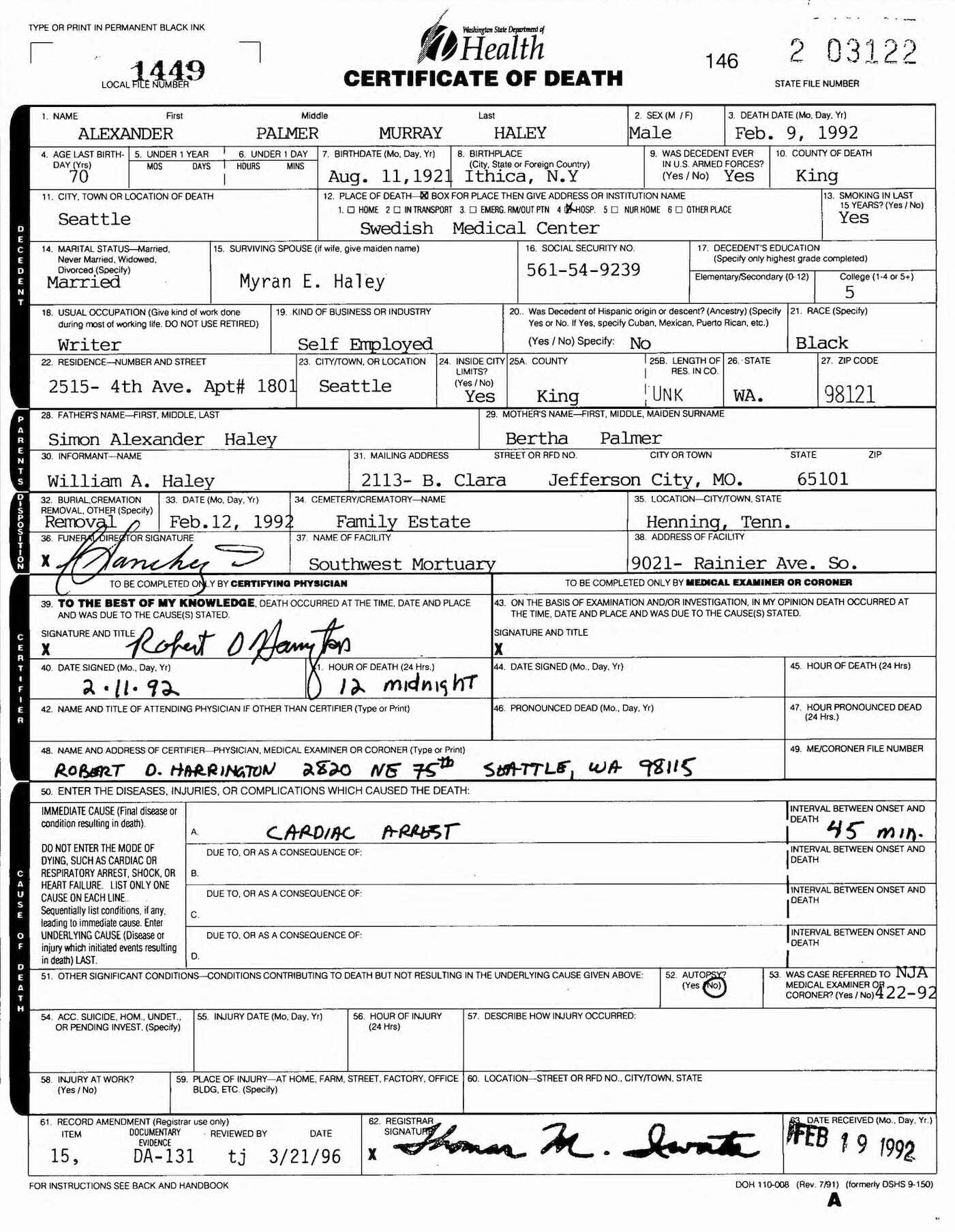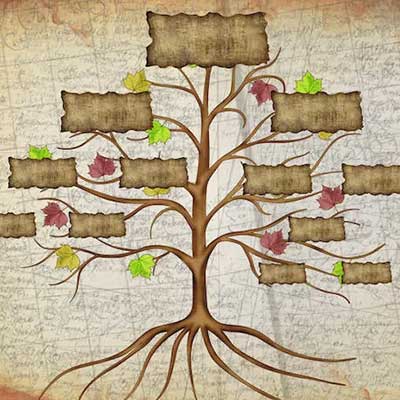- Home
- Family Tree and Family History
- Alex Haley Family History
Alex Haley Family History
Alex Haley Family History uncovers the captivating journey of Alex Haley's family history from slavery to "Roots." Explore the lasting legacy of one of America's iconic authors.
In this captivating article, you will explore the fascinating journey of Alex Haley's family history. From his ancestors' experiences during slavery to the groundbreaking book "Roots," this engaging account takes you on an inspiring quest to uncover the roots of one of America's most renowned authors. Discover the profound impact of Alex Haley's exploration and its lasting legacy that resonates with readers worldwide. Get ready to be captivated by the remarkable story of the Alex Haley family history.
Early Life and Ancestry
Birth and Childhood
Alexander Palmer Murray Haley was born to Simon Alexander Haley and Bertha George Palmer Haley on August 11, 1921, in Ithaca, New York. As he entered the world, little did anyone know that he would go on to make a profound impact on American literature and the exploration of African-American history. His early years were filled with love, curiosity, and the nurturing embrace of his family.
His ancestors carried a rich and multifaceted heritage. On his maternal side, his great-grandfather, Will Palmer, was a freed slave who became a successful farmer in Alabama. His paternal side hailed from Scotland; through his father's lineage, he could trace his roots back to the days of the American Revolution.
Roots in Tennessee
Although he was born in New York, the call of the South was strong in his blood. When he was just five years old, his family moved to Henning, Tennessee, where he spent his formative years immersed in the vibrant culture of the Deep South. Tennessee would play a significant role in shaping his identity. It would later serve as the backdrop for his acclaimed work, "Roots: The Saga of an American Family."
Influence of Family Ethos
The spirit and values instilled in him by his family would guide him throughout his life. His parents, Simon and Bertha Haley, were proud and hardworking individuals who prioritized education and encouraged him to pursue knowledge. They imbued in him a deep appreciation for his heritage, which would become the driving force behind his literary career.
Alex Haley Family History Slave Ancestry
Maternal Lineage
The legacy of slavery loomed large in his family history. Through his mother's side, he was connected to the resilient spirit of enslaved African Americans who endured unimaginable hardships but persevered. Their stories, passed down through generations, inspired him to uncover the truth of his roots and honor the resilience of his ancestors.
Paternal Lineage
While his father's side of the family did not directly experience the bondage of slavery, the scars and remnants of this dark chapter in American history still reverberated through their lives. As he delved into his family history, he unraveled the complex tapestry of his paternal lineage, discovering surprising connections and shared experiences with enslaved African Americans.
Impact of Slavery on Family History
The legacy of slavery left an indelible mark on his family's history. Through his research, he uncovered the brutal realities of bondage, the heart-wrenching separation of families, and the tenacity of those who fought for freedom. The interplay of his own family's journey with the larger narrative of African-American history became the driving force behind his mission to tell the story of his people.
Alex Haley's Parents
Simon Alexander Haley (Father)
His father, Simon Alexander Haley, was a strong and influential figure in your life. He was a well-respected professor, an author, and a World War I veteran. Growing up under his guidance, he witnessed firsthand the power of knowledge and storytelling. His passion for education would leave an indelible mark on his journey as a writer.
Bertha George Palmer (Mother)
His mother, Bertha George Palmer, embodied love, strength, and resilience. She instilled in him a deep sense of pride in his African-American heritage. She emphasized the importance of knowing and honoring your roots. Her unwavering support and encouragement fueled his ambition and propelled him to uncover his family's history.
Family Background and Upbringing
Raised in a tight-knit community, he was surrounded by the love and support of his extended family. The oral storytelling tradition was cherished, with relatives sharing tales of triumph and perseverance. These stories, passed down from generation to generation, illuminated the struggles and triumphs of his ancestors and would later serve as the foundation for his groundbreaking works.
Growing Up in Tennessee
Childhood Experiences
His childhood in Tennessee was filled with experiences that shaped his worldview. He roamed the fields and forests, listening intently to the stories told by the older community members. The bonds he forged with his neighbors, the joyous celebrations, and the struggles of daily life all contributed to his understanding of the rich tapestry of African-American culture.
Education and Inspirations
Despite African Americans' challenges in accessing quality education, he was fortunate to attend high school in Henning. It was here that he discovered his affinity for writing and storytelling. Inspired by the works of Langston Hughes and W.E.B. Du Bois, he found solace and inspiration in their words, which spoke to the shared experiences of African Americans.
Community and Social Dynamics
His Tennessee community was a microcosm of the larger African-American experience, with its unique social dynamics and challenges. Though the pervasive racism of the time sought to stifle the aspirations of African Americans, he witnessed firsthand the strength and resilience of his community. These experiences would shape his determination to amplify the voices and stories of his people through his writing.
Alex Haley's Career
Early Writing Endeavors
His passion for writing flourished early on, and he eagerly pursued opportunities to share his voice with the world. In the 1940s, he joined the Coast Guard and wrote personal letters for his fellow service members. This experience honed his writing skills and gave him a profound appreciation for the power of words to connect and heal.
Journalistic Achievements
After leaving the Coast Guard, he embarked on a successful freelance writer and journalist career. His articles showcased his ability to weave captivating narratives and shed light on critical social issues, particularly those affecting the African-American community. These early achievements laid the foundation for his future literary endeavors.
The Autobiography of Malcolm X
Collaborating with the charismatic civil rights leader Malcolm X was a turning point in his career. The collaboration resulted in the groundbreaking work, "The Autobiography of Malcolm X." As he skillfully incorporated Malcolm X's voice and experiences into the narrative, he solidified his reputation as a gifted writer who could capture the essence of a complex historical figure.
Roots: The Saga of an American Family

Undoubtedly, his most iconic work came to fruition with the publication of "Roots: The Saga of an American Family" in 1976. This seminal novel artfully blended fact and fiction, tracing his family's history to Kunta Kinte, an African man captured and sold into slavery. This powerful narrative sparked a national conversation about African-American history and catapulted him into literary stardom.
Impact and Legacy of His Works
The cultural impact of his works cannot be overstated. "The Autobiography of Malcolm X" and "Roots" inspired a generation of readers to explore their heritage. His writings brought attention to the universal human struggle for freedom and dignity, resonating with people of all backgrounds. His legacy inspires writers, historians, and activists to examine the complexities of race, identity, and the search for belonging.
Researching Roots
Motivation and Journey
Motivated by the stories passed down through generations and a burning desire to uncover his ancestral roots, he embarked on an extraordinary journey of research and discovery. Armed with his storytelling prowess and meticulous research skills, he embarked on a quest to trace his lineage to Africa, an expedition that would forever change the genealogy landscape.
Tracing Ancestry
His unyielding determination led him to archives, historical documents, and oral histories from both sides of the Atlantic. He pieced together the fragments of his family's history, carefully reconstructing the stories of his ancestors. Through meticulous research and collaboration with genealogists and historians, he tracked his roots back to Juffure, a village in The Gambia.
Collaboration with Historians and Genealogists
Recognizing the importance of collaboration, he worked closely with genealogists and historians to ensure the accuracy and authenticity of his research. His meticulous attention to detail and commitment to historical accuracy set a new standard for genealogical research. Together with these experts, he paved the way for a deeper understanding of African-American ancestry and the experiences of enslaved Africans.
Haley's African Heritage
 During his journey to Africa, he was embraced by the villagers of Juffure, the birthplace of his ancestor, Kunta Kinte
During his journey to Africa, he was embraced by the villagers of Juffure, the birthplace of his ancestor, Kunta KinteTrips to Africa
The firsthand experience of visiting Africa allowed him to forge a deep connection with his ancestral homeland. In 1967, he embarked on a trip to The Gambia, retracing the steps of his ancestors. The sights, sounds, and people he encountered left an indelible mark on his soul. They inspired him to honor his African heritage in his work.
Connection with Gambian Village
During his journey to Africa, he was embraced by the villagers of Juffure, the birthplace of his ancestor, Kunta Kinte. The warmth and hospitality of the Gambian people made it clear that he had found his second home. This spiritual connection fueled his determination to depict African communities' beauty, resilience, and struggles in his writing.
Cultural and Personal Discoveries
In Africa, he immersed himself in the vibrant cultures, traditions, and languages that had shaped his ancestors. The experiences of sharing stories with the villagers, participating in rituals, and witnessing the strength of the African people deepened his understanding of his heritage. These personal discoveries enriched his writing, giving it an authenticity that resonated with readers worldwide.
Controversies Surrounding Roots
Accusations of Plagiarism
Despite the immense success and cultural impact of "Roots," the work was not without its controversies. Accusations of plagiarism arose, claiming he had lifted portions of the book from other authors. While he acknowledged some factual errors, he maintained that the core narrative was based on the experiences and stories passed down in his family. The controversy surrounding "Roots" challenged him to defend his work and the authenticity and integrity of his storytelling.
Genealogical Accuracy Debates
As with any work of historical fiction, debates raged concerning the genealogical accuracy of "Roots." Critics questioned the reliability of oral history and the gaps in the records he relied upon. Yet, the broader impact of "Roots" cannot be denied. It shed light on the history of slavery. It sparked a renewed interest in genealogy, inspiring countless individuals to embark on their journeys of ancestral discovery.
Criticism and Responses
With the immense success of "Roots," he faced praise and criticism from various quarters. Some accused him of perpetuating stereotypes, while others pointed out historical inaccuracies. These challenges, although at times disheartening, prompted him to engage in open dialogue and reflection. He maintained that the overarching goal of "Roots" was to shed light on the history of the African-American experience and encourage all individuals to explore their heritage.
Legacy and Impact
 Alexander Palmer Murray Haley Death Certificate - February 9, 1992
Alexander Palmer Murray Haley Death Certificate - February 9, 1992Inspiring Interest in Genealogy
His work ignited a passion for genealogy among individuals from all walks of life. "Roots" prompted an unprecedented surge in genealogical research as people sought to uncover their ancestral connections. By intertwining his journey with the larger narrative of African-American history, he ignited a spark that empowered individuals to reclaim and celebrate their roots.
Promoting African-American History
Through his meticulous research and storytelling, he illuminated the often-overlooked history of African Americans. He shed light on African Americans' anguish, triumphs, and profound contributions to the fabric of American society. His work served as a reminder that the history of African Americans is, indeed, American history and must be embraced in its entirety.
Continued Influence on Literature and Media
The impact of his works continues to reverberate through literature and media. "Roots" revolutionized television when it was adapted into a miniseries that captivated audiences worldwide. Its immense popularity propelled discussions on race, history, and the legacy of slavery into the mainstream. His writings paved the way for subsequent generations of authors and filmmakers to explore and honor the African-American experience.
Alex Harley's journey from Tennessee to The Gambia and back again, his meticulous research, and his exceptional gift for storytelling transformed the landscape of African-American literature and genealogy. Through his works, he has inspired countless individuals to embrace their heritage, sparked conversations about race and identity, and deepened our understanding of the human experience. His legacy will forever be woven into the fabric of American history, serving as a testament to the enduring power of storytelling.













